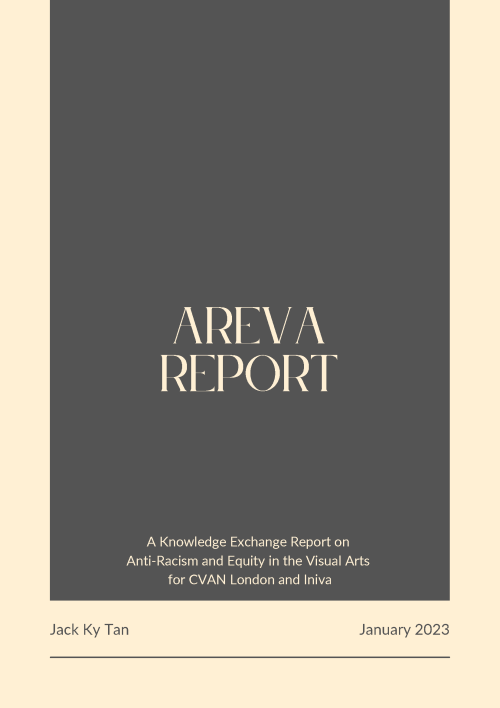
CVAN x INIVA Report on Anti-Racism and Equity in the Visual Arts
A report published today, sets out a new approach to tackling racism and inequity in the visual arts sector, and makes recommendations for a long-term, anti-racist development scheme to be adopted by arts institutions.
Written by artist Dr Jack Ky Tan, the report is the culmination of a knowledge exchange project initiated by CVAN London (Contemporary Visual Arts Network) in collaboration with iniva (Institute of International Visual Arts), exploring how arts organisations may establish and support anti-racist and
equitable working practices. The project was started following increasing reports of racist incidents experienced by artists and cultural workers in the sector, and the desire expressed by CVAN’s members to create a meaningful, proactive response to bring about change.
The research was carried out in two parts: the convening of two knowledge exchange roundtables with a cross-section of arts organisations in the CVAN London network led by Jack Ky Tan, and meetings with a group of artists hosted by artist Larry Achiampong.
The artist’s meetings were convened as a safe space to enable open conversations about artists’ experiences and to offer mutual support. They served to bear witness and to evidence the racism suffered by people working in the visual arts sector. The two roundtable knowledge exchange workshops were held for the institutional members of CVAN
London to explore their needs and experiences around tackling and experiencing racism and inequality. Led by artist Jack Ky Tan, the workshops took the question, “What does an anti-racist institution look like?” as a starting point to open discussion.
Dr Tan is an artist whose practice investigates organisational and legal structures, governance and systems. His creative response to the knowledge-exchange sessions, being launched today, is presented as “AREVA REPORT – A Knowledge Exchange Report on Anti-Racism and Equity in the Visual Arts.” Using an art practice as research approach, the report includes poetry as a method of recording conversations; and takes the radical performance artist Yoko Ono as inspiration for a range
of suggested interventions designed to test and challenge accepted structures and power dynamics in the workplace. The report concludes with a recommendation on the further work and investment needed to create an anti-racist and equitable arts ecology of the future.
Sepake Angiama, Artistic Director at iniva said, “We felt that this work was necessary following conversations with artists and the varying experiences they were having with cultural institutions that needed mediation. When you are an artist or cultural worker from a racialised community, you are met with challenges working within the arts. How do you decentre ‘whiteness’ within culture? This report highlights that cultural institutions need to ‘do the work’ of transforming their institutions to create greater awareness and understanding of how institutional racism operates, and to consider how to tackle it. It is not simply enough to expect people of colour to be the only ones to tackle these issues. For systemic change, we need to work together and recognise firstly that a change is needed. We can no longer pretend that racism does not exist – but we need to be active in combatting prejudices and attitudes that shape and inform the way we work.”
This research is part of a wider programme being developed by CVAN, Fair + Equitable (F+E), a fiveyear programme and commitment to instituting equity within the visual arts sector in England. The focus is on equipping the sector to actively facilitate change, to ensure that work to foster equity is not
simply a time-limited investment priority for funders and organisations but is thoroughly embedded into organisational practices across the sector. Above all else, this shift towards equity in the visual arts sector asks for organisations and stakeholders to take consistent and committed action, starting today.
Jo Townshend, CVAN London Director said, “We are proud to be working with iniva and Jack Ky Tan on the anti-racist and equitable visual arts project to support institutional and network development of anti-racist and equitable practice. We welcome Jack’s report and recommendations and commit to taking action. Working in collaboration with creative communities across London’s diverse and dynamic visual arts ecology, we will be holding further knowledge exchanges to co-create our future direction and contribute to the national CVAN Fair & Equitable Programme.”